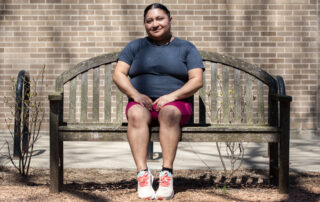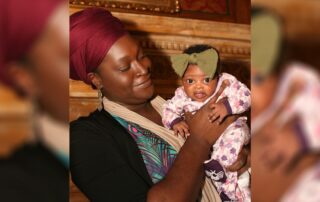Takeyla Benton has always tried to be strong for her kids. But, the Madison storyteller wonders if that has come at a price.
===
It’s a rare thing to get a glimpse of yourself from the outside.
A brief moment when you see yourself — all of your hard work, love, devotion, the sacrifices and sleepless nights and rushed mornings — through your kids eyes and think, “I’m a pretty freakin’ awesome mom! I should write a book or a blog and share my awesomeness with the masses.”
Well, this is not one of those times.
It’s more like one of those occasions where it was a cringed and crazed cartoonist’s image my kids were describing — with a lop-headed Afro, mismatched pajamas, surrounded by half-folded baskets of clothes and piles of books and papers with a cup of tea screaming, “Sweet baby Jesus, stop arguing! Will you kids just leave each other alone?”
“Why? Why, why? Why am I always stepping on Legos? Who left every cabinet in the kitchen open again? That’s it. Go to bed. Everybody just go to bed!”
I forced a smile recalling that day. I was very near losing it.
“It was an overwhelming day,” I said to my son. “I was very sad.”
“But you didn’t cry,” my little guy responded. “Moms get mad a lot, A LOT, but they don’t cry.”
In that instance, I realized how my kids must’ve seen me: As someone who instructs them on how to handle emotional overflows, but fails to take my own advice.
Have I failed to show my kids it’s OK to display emotions in a constructive way? Hmm. I don’t really shy away from the emotional expression of life. I just prefer to explode on paper or prose or poetic form, but surely I’ve cried in front of my kids, right?
Well, when I was pregnant, I remember crying all the time. ALL THE TIME. Those ASPCA commercials get me every time. But that was late at night and I’m sure my daughter was sleeping.
Oh, OK. So when my son had his surgery, the second he came out, I burst into tears. But OK, he was drugged up, so he probably didn’t remember that.
Surely they must have seen me cry, at least on one occasion. Maybe one of the times when the pain from my migraine reached a fever pitch? Probably not, since I prefer to hide in the bathroom — you know, in the dark, in the tub with a blanket over my head. That’s the best.
Now I tend to hide in the bathroom a lot, I think, when that uncomfortable emotional side of me starts taking over. Could that be why my kids refuse to allow me any privacy in the bathroom? Maybe they know. Even if I’m on the toilet, they feel it’s OK to burst in mid-argument, forcing me to mediate from the porcelain throne.
Locking the door doesn’t help either. I see little tiny fingers underneath the door. They slide notes under there. Hear my son screaming, “Mom Mom! I know you’re not using the bathroom. You have your phone. I can see it! Poo particles, poo particles are getting all over your phone!”
They don’t know that I’m Googling affirmations because everything that I know how to do is not working anymore. The darkness and depression is taking hold.
I’m alone, crying in the bathroom because I don’t want to be a single parent again. I’m replaying the last 14 years of my life trying to figure out what went wrong and, perhaps, if I had cried more in front of their dad, he wouldn’t have been so distant.
He has told me on many occasions that he felt I was only open when I was crying and my guard was down. I wonder if my kids view me that same way.
I’ve always been able to remain calm and help others through emotional valleys and trenches, but I really like to reserve my battles as fuel for literally fires.
No one wants to deal with an emotionally tortured writer. We’re difficult enough as it is, so not going to cry.
Yet, the thought that my kids have not seen me cry bothers me deeply. It bothers me as deeply as the constant tears that are ingrained on my shoulders that my mother cried on. I knew early on, I didn’t want to be emotional like that. I said I’d be a boulder like my grandmother, who I only ever saw shed a tear for my father’s incarceration.
Even when I saw her the last days of her life — laying in a hospital bed, tubes swirled around her body like lace curtains trying to keep back the sunlight — she looked at me and smiled and motioned for me to come and sit next to her on the bed. I couldn’t. I ran in the bathroom and cried. And I still regret that to this day.
“Moms do cry,” I told my son. “Like when you leave your Legos on the floor and I step on them, or especially when your sister uses up all the data? Yeah, I cry.”
“No, no. You curse, Mom. You don’t cry.”
Note to self. Stop cursing. At least out loud.
Or perhaps, the next time I’m in the bathroom and one of them slides a note under the door, I’ll write a reply back that says, “Mom is crying. Do not disturb.”
And slide back out to them, poo particles and all.
===
This transcript has been edited for brevity and clarity. Takeyla Benton told her story live at the “Listen To Your Mother” event in Madison and it can also be heard on the “Inside Stories” podcast.












